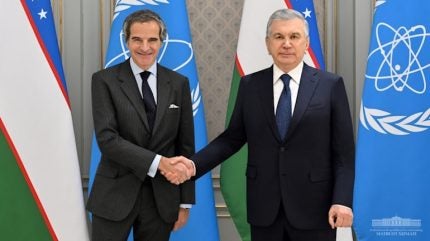
IAEA Director General Rafael Mariano Grossi, during a visit to Uzbekistan, held meetings with Uzbek President Shavkat Mirziyoyev, Director Azim Akhmedkhadjaev of the Uzatom Agency, Energy Minister Jurabek Mirzamakhmudov and nuclear regulator Rafikov Abduvakkos. The visit was part of ongoing support for Uzbekistan’s plans to use nuclear energy based on small modular reactors (SMRs) and a new cancer hospital.
Uzbekistan is currently planning to embark on its own nuclear power programme, with an initial build focusing on SMRs with six 55 MW reactors planned. In 2017, Uzbekistan signed an agreement with Russia for the construction of two large-scale VVER pressurised water reactors but has now prioritised the construction of a six-unit SMR NPP to be built in the Jizzakh region, based on the 55 MWe RITM-200N pressurised water reactor. This would be the first export order for the Russian design the first unit of which is currently being built in Yakutia. Rosatom Director General Alexei Likhachev earlier this year affirmed that plans for a large NPP still stand.
President Shavkat Mirziyoyev released a statement after his meeting with Grossi saying that the IAEA and Uzbekistan are expanding cooperation. “Collaboration will focus on strengthening national agencies, training specialists, and advancing projects in nuclear energy, agriculture, water management, healthcare, and ecology,” the statement said. This builds on an agreement between Uzbekistand and IAEA to adopt a joint roadmap on expanding multidimensional cooperation in peaceful nuclear development.
Grossi said the IAEA stands ready to support Uzbekistan’s ambitious plans to introduce nuclear power, including SMRs. “Together, we’ll work on the adoption of a robust legal framework to ensure the highest safety standards.”
On the second day of his visit the Director General spoke at a one-day inaugural conference, Use of Nuclear Energy for Peaceful Purposes in Sustainable Development of the Organization of Islamic Cooperation (OIC) Member States. He highlighted how the IAEA can help countries advance their nuclear power plans in a safe way.
Addressing the conference, President Shavkat Mirziyoyev said: “Our country was one of the first in the world to begin the construction of small nuclear power plants in accordance with international requirements and standards. We consider the IAEA as our major partner in the successful implementation of these projects, as well as a number of healthcare and scientific programmes.” He said ensuring reliable, safe, cost-effective and ecologically friendly energy sources was one of the top priorities in the large-scale reforms carried out in “New Uzbekistan”.
He added: “We have established a National Agency to strengthen the regulatory and legal framework in this sector, adopted a Law on the Peaceful Use of Atomic Energy, a long-term Concept of Nuclear Power Development, and a strategy aimed at strengthening human resources in the field. We have introduced a system of training highly skilled specialists for the industry.”
Other speakers included Minister of Energy Mirzamakhmudov, Justin Friedman from the Bureau of International Security and Nonproliferation at the US Department of State and Andrey Rozhdestvin CEO of Rosatom Western Europe, as well as Sama Bilbao from the World Nuclear Association (WNA). On the sidelines of the conference, Grossi signed an addendum to the country programme framework with Uzatom on support for the introduction of SMRs in the country. Uzatom also signed a memorandum of understanding on co-operation with WNA.
Another key area of IAEA support to Uzbekistan is in the field of healthcare, under the Agency’s Rays of Hope initiative, to improve access to cancer diagnosis and treatment. The Ministry of Health of Uzbekistan requested IAEA help to train personnel for a new oncology centre, in a project financed by the Islamic Development Bank with a budget of $2.3m.
Grossi also visited key sites advancing nuclear science in Uzbekistan including the Institute of Nuclear Physics and the Uzbek branch of Russia’s National Research Nuclear University (MEPhI). He noted: “The Institute of Nuclear Physics and its research reactor have been safely operating for 60 plus years and contributing to medical and industrial radioisotope production. This legacy sets a strong foundation for Uzbekistan’s nuclear power plans.”
During a meeting with MEPhI students Grossi said the highest standards of education are the foundation of any successful nuclear power programme. “This is one of the world’s most prestigious institutions in the field and shows its constant dedication to excellence. The IAEA will be supporting you all the way.”
On the 5th December 2024 a Memorandum of Understanding (MoU) was signed between the Atomic Energy Agency under the Cabinet of Ministers of the Republic of Uzbekistan (Uzatom) and World Nuclear Association. This was signed by Akhmedkhadjaev Azim Israilovich, Director of Atomic Energy Agency under the Cabinet of Ministers of the Republic of Uzbekistan, and Dr Sama Bilbao y León on behalf of World Nuclear Association.
Uzbekistan has been a member of the IAEA for 30 years and has implemented more than 40 joint projects with the agency’s technical assistance. Five such projects are currently under way, according to a statement from the Uzbek presidency. Priorities for cooperation discussed during Grossi’s visit included improving competence and potential of national agencies, preparing high-skilled personnel, and prospective projects in nuclear energy, agriculture, water use, healthcare and ecology in the framework of IAEA programmes, culminating in an agreement on adopting a joint roadmap on “expanding multidimensional cooperation in peaceful atom development”, the presidency said.






